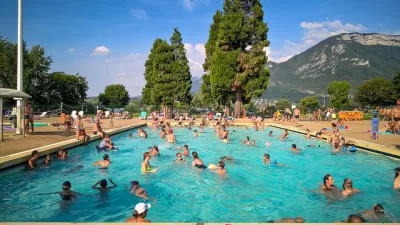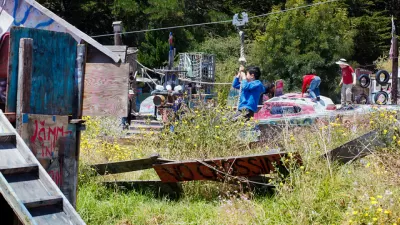As more and more children are kept in homes and yards, Joe Cortright worries about the effects of private play on American culture and public spaces.

"Changes in technology, the economy and society have all coalesced to create more fragmentation and division," Joe Cortright writes in City Observatory. This separation also affects children, Cortright argues, "instead of going to public parks and playgrounds, more children play in the copious backyards of suburban homes. This trend is amplified by helicopter parents."
As evidence of this growing separation, Cortright points to pools. In the first part of the 20th century, private pools were almost unheard of, now there are over 5 million. "The number of persons who belong to private gyms has increased from about 13 million in 1981 to more than 50 million," Cortright points out.
He goes on to say, "Public parks are one of the places where people of different races, ethnicities and incomes can come together and share experiences." As more people look to entertain themselves in private, these spaces may lose something important.
FULL STORY: New York Is Blowing The Kosciuszko Bridge Straight To Hell

Planetizen Federal Action Tracker
A weekly monitor of how Trump’s orders and actions are impacting planners and planning in America.

Maui's Vacation Rental Debate Turns Ugly
Verbal attacks, misinformation campaigns and fistfights plague a high-stakes debate to convert thousands of vacation rentals into long-term housing.

San Francisco Suspends Traffic Calming Amidst Record Deaths
Citing “a challenging fiscal landscape,” the city will cease the program on the heels of 42 traffic deaths, including 24 pedestrians.

Defunct Pittsburgh Power Plant to Become Residential Tower
A decommissioned steam heat plant will be redeveloped into almost 100 affordable housing units.

Trump Prompts Restructuring of Transportation Research Board in “Unprecedented Overreach”
The TRB has eliminated more than half of its committees including those focused on climate, equity, and cities.

Amtrak Rolls Out New Orleans to Alabama “Mardi Gras” Train
The new service will operate morning and evening departures between Mobile and New Orleans.
Urban Design for Planners 1: Software Tools
This six-course series explores essential urban design concepts using open source software and equips planners with the tools they need to participate fully in the urban design process.
Planning for Universal Design
Learn the tools for implementing Universal Design in planning regulations.
Heyer Gruel & Associates PA
JM Goldson LLC
Custer County Colorado
City of Camden Redevelopment Agency
City of Astoria
Transportation Research & Education Center (TREC) at Portland State University
Jefferson Parish Government
Camden Redevelopment Agency
City of Claremont




























